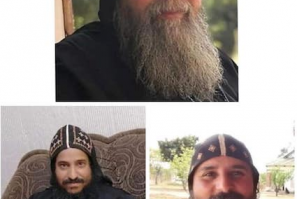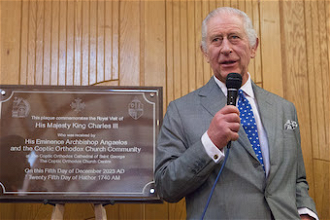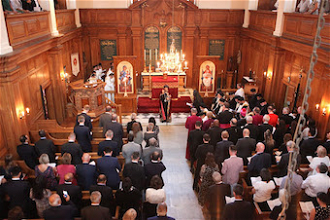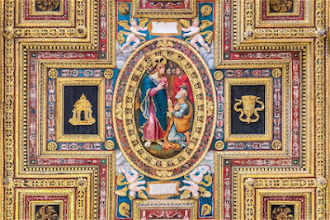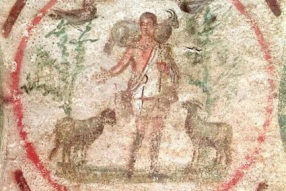Text: Bishop Angaelos at Coptic New Year service in St Margaret's, Westminster
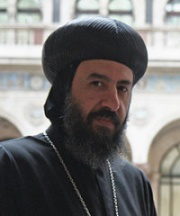
His Grace Bishop Angaelos
His Grace Bishop Angaelos, General Bishop of the Coptic Orthodox Church in the United Kingdom gave the following homily at St Margaret’s Church, Westminster Abbey during the celebration of the Feast of Nayrouz, on 10 September 2013.
The Feast of Nayrouz is a Feast of new beginnings in which, as with the beginning of the calendar year, we assess our lives and we try to start again. New beginnings are always wonderful, whether it be that new page in your book that looks so crisp, or that New Year’s resolution of going to the gym right at the beginning of the year. Either way, we like fresh starts.
Newness must not be a patchwork, but rather a complete start; something that it is begun in a way that gives it the ability to grow; a seedling that is planted and given the potential to develop into a beautiful fruitful tree that gives fruit to all. This is why our Lord, in the Gospel of St Matthew reminds us, that we “do not put unshrunk cloth on an old garment”, for if we have a patchwork life it can be easily torn apart and is not sustainable.
When we attempt to only partially change our lives we discover very quickly that the change is temporary. We have seen many patchwork changes over the past months and years, changes that desired to take part of the old, and merge it with the new. Patchwork changes that did not intend to eradicate any sort of corruptive elements but merely desired to place in new elements alongside. We know that does not work. We have seen the failing of this method in our lives, and it is clearly apparent that it does not work. Newness, however, must be placed on a very firm foundation.
Again in the Gospel of St Matthew, chapter 7, our Lord warns us that a house built on sand, on moving ground and uncertain circumstances will most certainly fall, while a house built on a rock, firm and founded, will most definitely stand and can grow. So too, must we place our new beginnings on firm ground. Whether in our own personal lives, newly emerging democracies, ailing economies, or decisions made on a daily basis, that rock is important. What is the rock? It is not an illusion, it is not smoke and mirrors, nor people who say things but cannot deliver, and it is not those who make promises and then decide not to fulfil them. It is a Rock built on Truth.
Change cannot be cosmetic, newness cannot be superficial, because we have been told in the Gospel of St Matthew 25 that “if lawlessness will abound, the love of many will grow cold.” With that shaky ground comes lawlessness, and we have seen lawlessness in many ways: at a personal level, with the persecution of Christians not only in Egypt but throughout the world, but also with the persecution of those who desire new starts in life and are not given the opportunity. We have seen lawlessness with the burning of churches, dozens over a series of hours; with regimes that come and go, all of which are built on sand and are not built on the rock. That rock is that which makes us firm where we stand and confident where we step, and because we are here in this place, across from the Houses of Parliament, we are thankful to this nation’s government, that was not so quick to judge matters.
Many conversations regarding ‘coups’ and democratic processes, have led to decisions built on that rock; decisions that were taken one step at a time, leading to wisdom that builds, wisdom that is, as we have seen in recent days thinking about our own brethren in Syria, now leads the world. It is that rock of certainty that we must abide by.
Our Lord is that element in our lives into which we must be deeply rooted. St Paul reminds us not to be a patchwork garment, but to be in the newness of Christ by “putting on Christ”; by putting on His Faith and His life, as well as that which He guides and inspires us to. Through putting on Christ, we are also empowered to do those things that can only come from Him. We are empowered because we are not only those who are preached the Resurrection but are in fellowship of His suffering and so therefore are conformed to His death and victorious in that Resurrection. We are not bystanders, and we are not passengers. We are part of that Resurrection, the Resurrection that was there for the whole world, and that calls us all to victory. That Resurrection is real in our lives every day, but to be part of that powerful act we most certainly, as we as a Church have experienced and live, must have fellowship in His sufferings.
There was a wonderful statement by the head of The Coptic Orthodox Church, Pope Tawadros, when he was asked what he thought would happen when these churches were burned down so horrifically, and he said ‘if these are but a small sacrifice then this is a sacrifice we present.’ We have lost buildings, but we within our tradition and within our heritage have lost millions who died for their Faith, and who continue to die for their Faith. The concept of martyrdom is not just one of the past, it is now, and it is lived until today, not just in Egypt, but also in places like Nigeria, Iran, and China. These individuals are martyrs not because they choose to cause destruction, but are martyrs in that their lives are taken because they will not give up what they believe.
This newness also brings with it, in its final step, the beauty that is reconciliation. Reconciliation is what the Incarnation was for, to reconcile the world, just as we too must be reconcilers. We are told in the second epistle to the Corinthians that all things have passed away, we must put aside all the old things and look forward to the new, to reconcile and to grow together in our homes, communities, countries, and with our faiths. We have no way forward but reconciliation.
We are a reality in each other’s lives, and we are a beautiful reality. The diversity of who we are is a testimony to the creative sovereignty of God, and so we, in gracious obedience to that sovereignty, must be reconciled and accept one another on grounds that we heard in today’s Gospel, in freedom for all, a freedom of Faith, religion, expression, and of life. We must move forward leaving that which is defiled behind if we are going to make a fresh start.
I want to conclude with a very powerful passage that I find inspires me, especially in light of events in Egypt, here in the United Kingdom, Syria, and throughout the world. When we are encouraged not to say what we believe, or not to live or proclaim our Faith, and told sometimes that we have no right to believe at all, we stand fast because we are empowered through reconciliation and through newness in our Lord Jesus Christ. St Paul reminds us in second Corinthians that “We are hard-pressed on every side, yet not crushed; we are perplexed, but not in despair; persecuted, but not forsaken; struck down, but not destroyed…”
This is who we are. This is the power we have; the image and likeness of God within each and every one of us that calls us to be true, to be faithful, and to be new in ourselves every day. In our repentance and reconciliation and in a beginning that will bring hope to many both victoriously and valiantly; with pride and assurance that we are not alone, but rather in the hands of a mighty and faithful God Who says that in the world we will “have tribulation”, we are of “good cheer”. Why Lord, why would we be of good cheer? Our Lord would respond, ‘It is quite simple, be of good cheer, for I have overcome these tribulations, I have given you victory and reconciliation and I have given you a power that will be with you all the days of your life, until we once more are reconciled in the Kingdom that is prepared for you.’
Glory be to God forever, Amen.
For more information on the Coptic Orthodox Church in the UK see: www.copticcentre.com/default.aspx



